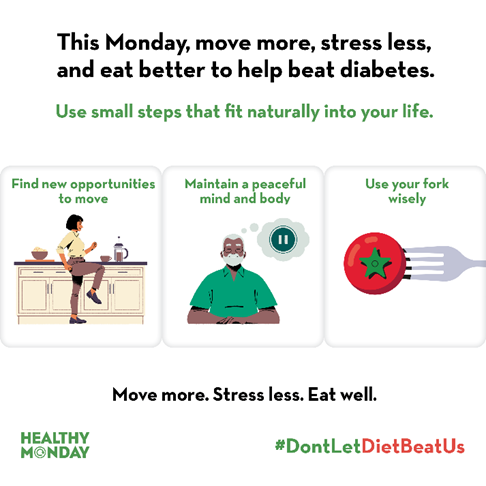Enjoy This Week’s CommonHealth Weekly Wellnote!
Beat Diabetes with Healthy Activity
November is recognized as American Diabetes Month by The American Diabetes Association. During this month, health advocates from various communities collaborate to raise awareness of diabetes, provide information and available resources to help prevent and manage diabetes. For more on preventing and treating diabetes, watch the video on the 2022 campaign, Today’s Diabetes Hits Different, and review the information below.
Prediabetes and Diabetes. An estimated 1 in 3 U.S. adults have prediabetes, and of these 88 million people, over 80% aren’t aware of their condition. People with prediabetes are at increased risk for developing type 2 diabetes, heart disease and stroke. The good news is that by committing to a few simple lifestyle changes, people at-risk or with prediabetes can dramatically reduce their likelihood of developing type 2 diabetes or other major health complications.
What is type 2 diabetes? Type 2 diabetes impacts the body’s metabolism of sugar. Insulin’s role is to aid in the absorption of sugar from foods, so it can be used by the body for energy. In people with type 2 diabetes, the body doesn’t produce enough insulin or respond to insulin adequately. As a result, sugars build up in the bloodstream. High blood sugar can cause many health complications, including blindness or other serious eye problems, kidney disease, nerve damage and other health issues.
Type 2 diabetes is diagnosed by elevated blood sugar levels. The hemoglobin A1C blood test indicates average blood sugar levels over the past three months. People with an A1C above 6.5% are diagnosed with type 2 diabetes, and those with an A1C between 5.7% – 6.4% are diagnosed with prediabetes. People with prediabetes have a 50% chance of developing type 2 diabetes within 5 to 10 years. Because some complications develop without symptoms, it’s important to have your doctor screen you for prediabetes regularly.
How do I prevent type 2 diabetes? Two major risk factors that dramatically increase the risk of diabetes are being overweight and being inactive. By adopting a healthy lifestyle, people can reduce the impact of complications from diabetes and decrease the chance that prediabetes turns into diabetes. The Centers for Disease Control and Prevention’s (CDC) Diabetes Prevention Program or DPP, helps people with prediabetes maintain a healthy weight through regular physical activity, health food choices and behavioral support. Participating in this program can reduce your risk of diabetes by over 50 percent.
It’s also a great time to explore the Healthy People 2030 Diabetes objectives, which aim to reduce the burden of diabetes and improve the lives of people living with or at risk for the condition. Finally, be sure to review the consumer-friendly MyHealthfinder diabetes resources.
Healthy Monday Tips:
- According to the American Diabetes Association, diabetes is the leading cause of vision loss in people 18–64 years old. To learn more, join Amy Moore from CommonHealth on zoom. Register your intent to participate here.
CommonHealth Presentation: Wise Eyes with Amy Moore
Wednesday, November 30, from 1:30 p.m. until 2:30 p.m.
The earlier we start looking after the health of our eyes, the better our chance of maintaining good vision throughout our lifetime. Good vision isn’t just about seeing well; it’s about living well!
- Small steps are key. Using Monday as a weekly cue to commit or recommit to healthy behavior is an evidence-based way to stay on track with your health goals. By incorporating more healthy eating, physical activity, regular sleep, and mental health self-care practices into your weekly routine, you can better prevent or manage type 2 diabetes. Search the Daily Flyer for past Move It Monday announcements and use the information to move the needle forward on your physical wellness journey. There’s still time to get moving this fall.
- Register here and join your colleagues on the Moving Outdoors adventures. Participants are having an AMAZING time and learning so much more than expected.
- Register here for the Common Health Virtual Turkey Trot.
For more details see the following Start Every Week With a Healthy Activity to Help Prevent Diabetes (mondaycampaigns.org).
Move It Monday! Campaign: Weekly Check Ins
Mindful awareness, accountability, goal setting and tracking progress are evidence-based techniques that enhance the success of a wellness plan. Each week, the Move It Monday! Campaign participants are invited to use the weekly check- Ins (Weekly Check In, Nov. 7) to help you;
- Remain motivated;
- Reflect on your progress;
- Consider how you will work with your Push Pal to get the most effective results from your wellness experiences; and
- Recommit to your weekly goals.
Together we can turn intentions into actions.

For questions regarding this week’s communication or the CommonHealth program, you can also reach out to your respective campus coordinator below:
- Alexandria – Kathy Clement (KClement@nvcc.edu) or Najeeb Baha (NBaha@nvcc.edu)
- Annandale – Matthew “Tank” McCarl (mmccarl@nvcc.edu)
- Fairfax/College Staff – Dahlia Henry-Tett (DHTett@nvcc.edu)
- Loudoun – Tammy Wagner (TWagner@nvcc.edu)
- Manassas – ThuyTien Ngo-Nguyen (TNgoNguyen@nvcc.edu)
- Medical Education Campus (Springfield) – Beverly Tsikata (btsikata@nvcc.edu)
- Woodbridge – Amira Alexander (AAlexander@nvcc.edu)
